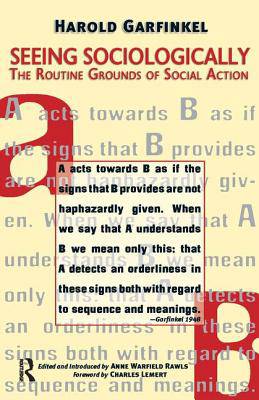
- Afhalen na 1 uur in een winkel met voorraad
- Gratis thuislevering in België vanaf € 30
- Ruim aanbod met 7 miljoen producten
- Afhalen na 1 uur in een winkel met voorraad
- Gratis thuislevering in België vanaf € 30
- Ruim aanbod met 7 miljoen producten
Zoeken
Seeing Sociologically
The Routine Grounds of Social Action
Harold Garfinkel, Anne Rawls, Charles C Lemert
Paperback | Engels
€ 94,95
+ 189 punten
Uitvoering
Omschrijving
This book-never before published-is eminent sociologist Harold Garfinkel's earliest attempt, while at Harvard in 1948, to bridge the growing gap in American sociology. This gap was generated by a Parsonian paradigm that emphasised a scientific approach to sociological description, one that increasingly distanced itself from social phenomena in the increasingly influential ways studied by phenomenologists. It was Garfinkel's idea that phenomenological description, rendered in more empirical and interactive terms, might remedy shortcomings in the reigning Parsonian view. Garfinkel soon gave up the attempt to repair scientific description, and his focus became increasingly empirical until, in 1954, he famously coined the term "Ethnomethodology." However, in this early manuscript can be seen more clearly than in some of his later work the struggle with a conceptual and positivist rendering of social relations that ultimately informed Garfinkel's position. Here we find the sources of his turn toward ethnomethodology, which would influence subsequent generations of sociologists. Essential reading for all social theory scholars and graduate students and for a wider range of social scientists in anthropology, ethnomethodology, and other fields.
Specificaties
Betrokkenen
- Auteur(s):
- Uitgeverij:
Inhoud
- Aantal bladzijden:
- 254
- Taal:
- Engels
Eigenschappen
- Productcode (EAN):
- 9781594510939
- Verschijningsdatum:
- 30/11/2005
- Uitvoering:
- Paperback
- Formaat:
- Trade paperback (VS)
- Afmetingen:
- 140 mm x 217 mm
- Gewicht:
- 299 g

Alleen bij Standaard Boekhandel
+ 189 punten op je klantenkaart van Standaard Boekhandel
Beoordelingen
We publiceren alleen reviews die voldoen aan de voorwaarden voor reviews. Bekijk onze voorwaarden voor reviews.











